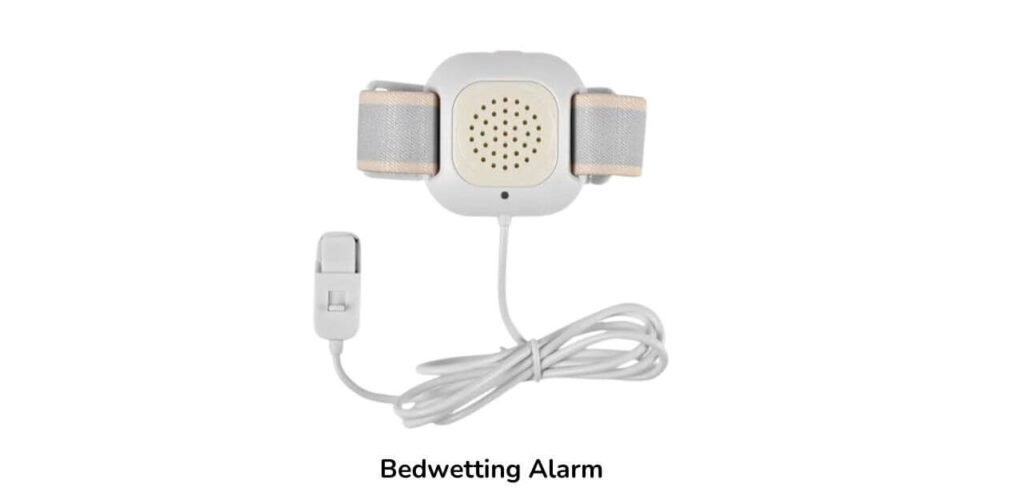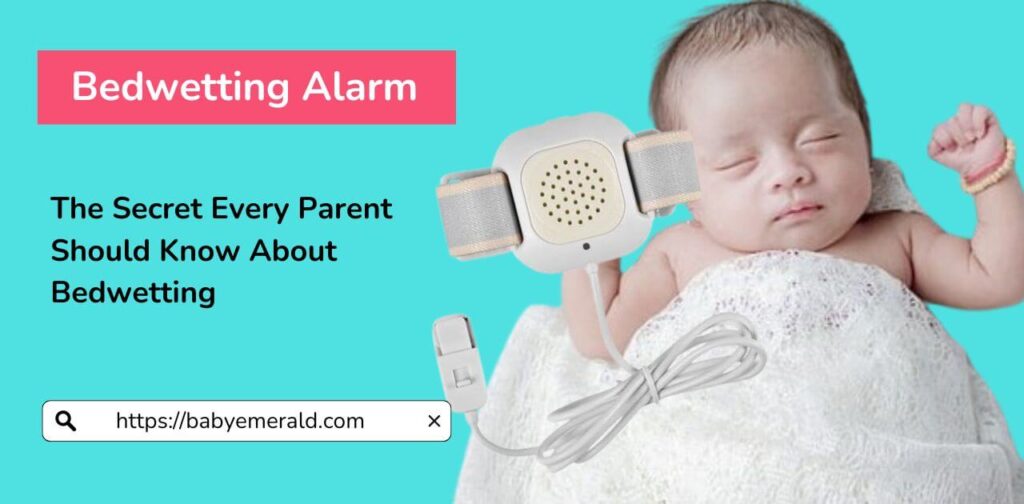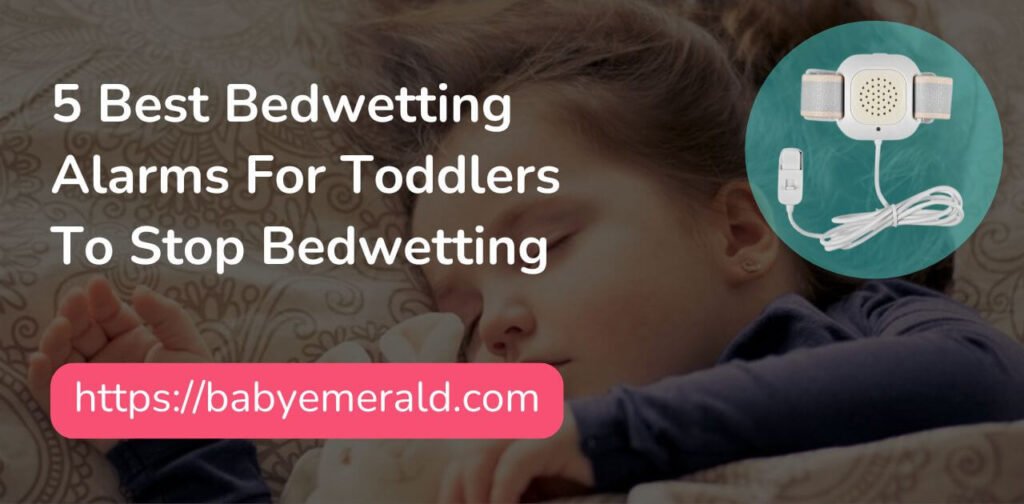No doubt, bedwetting is one of the frustrating things we parents have to deal with at some point in our child’s life, the worst is to constantly deal with your child’s bedwetting issues at night when you have rest from a hectic day, waking up every night to help them go pee, and if you’re not able to help them, you’ll always end up with loads of laundry to wash after a stressful day.
As a parent I understand You might have tried every other method to see if they work like limiting liquids you give to your baby at night, using disposable underwear.
I tried all these too but they weren’t lasting solutions. Someone like me with 3 kids couldn’t cope at all at that time.
What if I told you there’s a simple, safe drug-free solution that can really work to solve bedwetting for good?
Now let me tell this;
If you want to help your child stop bedwetting, getting a any of these 5 best bedwetting alarms recommended by Pediatricians could be the life-changing decision you have.
These are little devices you have to either place on your child or close to your child, they have helped countless families like yours achieve permanent dry nights.
In this post, I will explain everything you need to know about bedwetting alarms, how they work, the best and safe ones to get for your child and where to get high quality one.
If you’re ready, let me walk through how these bedwetting alarms work.
Understanding Bedwetting
Before we get into how bedwetting alarms can help, it’s important to understand what’s actually causing the bedwetting issues in the first place.
Bedwetting, or nocturnal enuresis, is involuntary urination that happens at night while sleeping. It’s incredibly common, especially in younger kids – studies estimate that up to 20% of 5-year-olds and 10% of 7-year-olds regularly wet the bed.
For most children, bedwetting isn’t a psychological issue or sign that something is “wrong.” It’s simply a temporary disconnect between the brain and bladder while their bodies mature.
There are a few key causes that can contribute to regular bedwetting I have known over the time and they include:
- Immature Bladder: A child’s bladder may not be fully developed yet, causing it to wake up and signal the need for a bathroom run.
- Deep Sleepers: Some kids are such deep sleepers that they simply don’t wake up to the urge to pee. Their brain doesn’t get the “gotta go” signal.
- Small Bladder Capacity: A bladder that can’t hold as much urine means it needs to pass out the ones it contains regularly and it’s common in children.
- Hormones: Not producing enough antidiuretic hormone (ADH) can lead to overproduction of urine while sleeping.
So, if your child bedwetts every now and then, it’s usually not a serious issue. But if your child is regularly wetting the bed twice a week or more for 3+ consecutive months, that meets the clinical definition of nocturnal enuresis.
That’s when bedwetting tends to cause more emotional issues like embarrassment, lower self-esteem, avoidance of sleepovers, etc. It’s also a sign that it may be time to seek medical advice, especially if the bedwetting is accompanied by any daytime wetting, urinary tract infections, or other concerning symptoms.
In the above cases, your pediatrician may recommend things like moisture alarms (more on those soon!), medication to reduce urine production, or counseling to address any psychological factors. But for most kids, nocturnal enuresis is just part of the natural potty training process that they’ll eventually overcome with time.
What I find interesting here is that Bedwetting alarms have been clinically proven to be the safest, most effective long-term solution for beating nocturnal enuresis once and for all at least from experience.
How A Bedwetting Alarm Works
The question I asked when I was introduced to bedwetting alarms as the solution to my kid’s bedwetting issues was: “How do these Bedwetting alarms work?”

All bedwetting alarms have three basic components:
- A moisture sensor.
- An alarm unit.
- Some way to attach the sensor (usually a clip or special underwear).
The moisture sensor is the key. It’s a small strip or pad made from a conductive material like metal or cloth that gets placed right against your child’s underwear or pajamas in the potty region.
As soon as the first few drops of urine hit the sensor, it completes an electrical circuit that immediately triggers the alarm unit to go off – whether that’s a loud noise, vibration against their body, or a combination of both audio and vibration cues.
That startling alarm is designed to instantly wake your baby up so they can stop the urine flow and make their way to the bathroom to finish, rather than just wetting the whole bed.
Hope you understand how bedwetting alarms work now?
Different types of bedwetting alarms use varying alarm methods. Some strictly use sound, others use vibration pads that clip onto pajamas. The most effective alarms give you options to use both sound and vibration.
The idea behind this bedwetting alarm is that once your child’s brain associates that alarming audio or vibration feedback with the start of wetting, it will eventually learn to wake up and hold it until getting to the toilet.
That being said, this brings me to discuss the benefits you derive using this device to stop bedwetting.
Benefits of Using a Bedwetting Alarm
As a mother of 3, I have had firsthand experience handling bedwetting kids. One of the biggest benefits I have enjoyed using a bedwetting alarm is the impact it has had on my child’s self-esteem and confidence.
For a kid, being labeled as the “bedwetter” among friends is totally embarrassing. It can make them feel ashamed, inadequate, and avoid social situations like sleepovers completely.
This is emotionally tough for such a child
A bedwetting alarm helps them regain control over their body and bladder. Each night they wake up dry is a victory that builds their self-assurance. As they make progress, that confidence snowballs in the most wonderful way.
But the alarms don’t just provide an emotional boost. They physically retrain the brain-bladder connection too. Studies show bedwetting alarms are the most effective treatment for achieving complete nighttime dryness.
You may be wondering how effective we are talking about here? Clinical data suggests that an impressive 65-70% of children become completely dry within 3-6 months of diligently using a bedwetting alarm. A report by PubMed Central has it that children given alarms are 13 times likely not bedwet compared to children without alarms. For most families, that’s life-changing.
Instead of relying on drugs or endless doing loads of laundry, these smart little alarms get to the root of the issue. Your child develops lasting bladder control while regaining their dignity and self-assurance.
How do you know the right bedwetting alarms to get?
This is where most parents find it difficult because the pages of Google are filled with websites selling all kinds of bedwetting alarms
Most times you become overwhelmed by the choices between all bedwetting alarms and which one to get. Below you can find the best bedwetting alarms you might want to try
Choosing the Right Bedwetting Alarm
With so many different bedwetting alarms on the market, it can be overwhelming trying to pick the right one for your child’s needs.
But don’t worry. I’ve got you covered with some practical tips on what to look for.
Now, one key factor is your child’s age and size.
You want to get something made specially for your child’s age and something that fits his or her age.
- Smaller kids may need an alarm with a more adjustable, secure fit so the sensor doesn’t get dislodged overnight.
- Older kids can likely handle a basic clip-on design just fine.
You’ll also want to think about alarm features like sound vs vibration modes. Some deep sleepers may need the jolt of both sound and vibration to fully wake up. But for light sleepers, a vibration-only alarm could be enough without disturbing the whole house.
Adjustable volume controls, moisture detection settings, and wireless connectivity for parent alerts are other bells and whistles some higher-end alarms offer. They’re not essential, but can provide extra customization.
Then there’s cost and reusability. The most affordable alarms are basic one-and-done units. But spending a bit more on an alarm built to last through multiple kids and hundreds of washes can provide more value long-term.
With all of those factors in mind, one bedwetting alarm that really stands out to me is the Therapee Bedwetting Alarm system.
What makes the Therapee so great is:
- It eliminates false alerts.
- It has broad sensor pad for instant wetness detection. This picks up on even the slightest bit of moisture.
- It has a powerful sound system to ensure your child wakes up even if he or she is a deep sleeper.
- No wire has to be placed on your child.
- Suitable bedwetting alarm for boys and girls.
The only downside of Therapee is that it’s specifically made for older kids between 4-18. If you have smaller kids, you might consider Chummie Bedwetting alarm.
Some parents worry about how the adjustable design offers a secure, comfortable fit for any age, no more stabbing wires or poorly placed sensors as it doesn’t place wire on your child, rather it’s placed a chair close to the child. The loud 90+ dB sound is adjustable to 10 unique sounds.
With a 180-night money back guarantee and over 1,900+ success stories, the Therapee just seems like a no-brainer to me, but whatever alarm you choose, stick with it! That consistency is key. Learn more about TheraPee pros and cons
How To Use a Bedwetting Alarm Effectively
Let’s say you’ve got your bedwetting alarm all picked out.
Here’s a simple step-by-step guide on how to set it up and use it properly for the best results:
1) Read the instructions thoroughly and do a trial run when your child is awake. Get them familiar with how the alarm works, what it feels/sounds like, where the sensor gets positioned, etc. This builds awareness.
2) Establish a consistent bedtime routine that incorporates the alarm. Have your child go to the bathroom one final time before clipping on the sensor and alarm unit.
3) Use positive reinforcement! Create a fun rewards system to motivate and celebrate small victories. Maybe they get a sticker each night they wake up dry or something they’re working towards.
4) Stick with it every single night, even after accidents. Consistency is important for retraining that brain-bladder connection. Using the alarm on and off just confuses things.
5) When the alarm goes off at night, calmly wake your child and guide them to the bathroom to finish peeing. Reassure them it’s not a big deal and praise their effort.
6) Try not to get discouraged by occasional accidents. Some kids take longer than others to get fully dry. The key is staying patient and consistent.
You may face some common challenges like your child trying to remove or turn off the alarm while sleeping. Special alarm-control pants can prevent this. Or you may need to experiment with different alarm sounds/vibration levels if they’re sleeping through it.
If your child seems discouraged by frequent accidents in the beginning, remind them that’s normal! Celebrate small steps like waking up to the alarm or having a few drier nights. The more you encourage their effort, the faster the progress.
Apart from getting this alarm, you can incorporate some other good bedwetting habits like:
- Limiting fluids for 1-2 hours before bedtime.
- “Double voiding” by having them try to pee again right before putting on the alarm.
- Using washable bed pads to protect the mattress
But the most important thing is using the alarm properly and sticking with it. With consistency and patience, that alarm will get the job done.
Disclosure: some of the links in this post may contain affiliate links, meaning I may earn a small commission if you make a purchase through those links. This comes at no extra cost to you, Rest assured I only recommend products I truly believe in.
3 Best Recommended Bedwetting Alarms To Buy
- Best overall: TheraPee Bedwetting Alarm The best suitable for children between the age of 4-18. One thing that made this exceptional is that it has recorded a 90% success rate and Dr. Sagie(the developer specialist) has encouraging videos combined with the assigned therapeutic exercises which offers relief to both parents and the child. It has a powerful speaker perfect for deep sleep • No wire is placed on the child. You can check it out on Amazon
- Dri Sleeper: This is best suitable if you’re looking for a wireless bedwetting alarm for your kids. You can check it out on Amazon
- Chummie Bedwetting Alarm: This particular device is a premium bedwetting alarm for deep sleepers. If you’re looking for the best made for deep sleepers, you can check it out on Amazon as a lot of parents have it this month.
FAQs About Bedwetting Alarms
How long does it typically take to see results with an alarm?
Most experts recommend giving it at least 3-4 months of consistent alarm use before expecting to see significant progress towards complete dryness. However, many children start waking up to the alarms within just a few weeks as their brain-bladder connection strengthens.
Is my child going to become dependent on the alarm forever?”
This is a common worry, but luckily the answer is no. The whole point of an alarm is to create long-lasting habits by associating waking up with the need to pee. Once those pathways are firmly established in the brain, your child will eventually be able to consistently rouse themselves without the external alarm cue.
Won’t the alarm disrupt our whole family’s sleep every night?
Not necessarily! Higher quality alarms have adjustable volume controls so you can set the sound to only what’s needed to wake your child. Combined with a vibration mode, this allows the alarm to be plenty effective without blaring throughout the entire house.
What is the success rate of bedwetting alarms?
Bedwetting alarm success rate ranges 65%- 95%, A study published on Yale School of Medicine, has it that children using a bedwetting alarm regularly had a 94% success rate in staying drier
Conclusion
Bedwetting is a frustrating reality for so many families, but you don’t have to keep struggling through the laundry and emotional turmoil. Bedwetting alarms offer a proven, drug-free way to finally achieve permanent nighttime dryness and boost your child’s confidence. Let me know if this article helps you find the best Bedwetting alarm for your baby.

